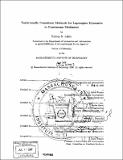| dc.contributor.advisor | Jamie Peraire. | en_US |
| dc.contributor.author | Lahiri, Sudeep Kumar | en_US |
| dc.contributor.other | Massachusetts Institute of Technology. Dept. of Aeronautics and Astronautics. | en_US |
| dc.date.accessioned | 2007-11-16T14:30:46Z | |
| dc.date.available | 2007-11-16T14:30:46Z | |
| dc.date.copyright | 2006 | en_US |
| dc.date.issued | 2006 | en_US |
| dc.identifier.uri | http://hdl.handle.net/1721.1/39597 | |
| dc.description | Thesis (Ph. D.)--Massachusetts Institute of Technology, Dept. of Aeronautics and Astronautics, 2006. | en_US |
| dc.description | Includes bibliographical references (p. 135-143). | en_US |
| dc.description.abstract | Rapid dynamics are commonly encountered in industrial applications such as forging, crash tests and many others. These problems are typically non-linear due to large deformations and/or non-linear constitutive relations. Such problems are typically modelled from a Lagrangian viewpoint, where the mesh is attached to the body; hence, large deformations lead to large distortions in the mesh. Explicit numerical methods are considered to be efficient in these cases where large meshes and small time-steps are employed for spatial and temporal resolution. However, incompressible and nearly incompressible materials pose a problem as the timestep stability restriction in explicit methods becomes increasingly severe. Most of the numerical methods employed for such simulations, are developed from discretization of the equations of motion. Recently, Variational Integrators have been developed where the numerical time integration scheme is developed from a variational principle based on Hamilton's principle of stationary action. Such methods ensure conservation of linear and angular momentum, which lead to more physically consistent simulations. | en_US |
| dc.description.abstract | (cont.) In this research, numerical methods addressing incompressibility and mesh distortions have been developed under a variational framework. A variational formulation for mesh adaptation procedures, involving local mesh changes for triangular meshes, is presented. Such procedures are very well suited for explicit methods, without significant expense. Conservation properties of such methods are proved and demonstrated. Further, a Fractional Time-Step method is developed, from a variational framework, for incompressible and nearly incompressible problems. Algorithmic details are presented, followed by examples demonstrating the performance of the method. | en_US |
| dc.description.statementofresponsibility | by Sudeep K. Lahiri. | en_US |
| dc.format.extent | 143 p. | en_US |
| dc.language.iso | eng | en_US |
| dc.publisher | Massachusetts Institute of Technology | en_US |
| dc.rights | M.I.T. theses are protected by copyright. They may be viewed from this source for any purpose, but reproduction or distribution in any format is prohibited without written permission. See provided URL for inquiries about permission. | en_US |
| dc.rights.uri | http://dspace.mit.edu/handle/1721.1/7582 | |
| dc.subject | Aeronautics and Astronautics. | en_US |
| dc.title | Variationally consistent methods for Lagrangian dynamics in continuum mechanics | en_US |
| dc.type | Thesis | en_US |
| dc.description.degree | Ph.D. | en_US |
| dc.contributor.department | Massachusetts Institute of Technology. Department of Aeronautics and Astronautics | |
| dc.identifier.oclc | 176102658 | en_US |
